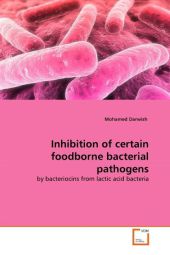 Neuerscheinungen 2010Stand: 2020-01-07 |
Schnellsuche
ISBN/Stichwort/Autor
|
Herderstraße 10
10625 Berlin
Tel.: 030 315 714 16
Fax 030 315 714 14
info@buchspektrum.de |

Mohamed Darwish
Inhibition of certain foodborne bacterial pathogens
by bacteriocins from lactic acid bacteria
2010. 224 S.
Verlag/Jahr: VDM VERLAG DR. MÜLLER 2010
ISBN: 3-639-29075-5 (3639290755)
Neue ISBN: 978-3-639-29075-2 (9783639290752)
Preis und Lieferzeit: Bitte klicken
Bacteriocins are proteins or peptides that are naturally produced by various bacterial strains including lactic acid bacteria (LAB). They show antibactericidal or antibacteriostatic activity against closely-related microorganisms. One advantage of bacteriocins is that they are hydrolyzed by proteolytic enzymes during the digestion of foods containing them. This does not allow their accumulation in human bodies or their inhibition of beneficial bacteria in the gut. The toxicity of high concentrations of bacteriocins are very limited, if any. LAB are known to synthesize several bacteriocin compounds, of which nisin has captured most of research interest. Nisin is a small, hydrophobic and heat-stable peptide that is produced by strains of Lactococcus lactis subsp. lactis. It shows inhibitory effect against related Gram-positive bacteria including sporeforming bacteria. For this reason, it has been widely used as a natural preservative in process cheese to prevent gas formation by sporeforming bacteria. Nisin has been also employed in the preservation of fluid milk in developing countries where there is a lack of refrigeration facilities.
Mohamed Samir Mohamed Darwish completed his B.Sc. in Food Sciences and M.Sc. in Agricultural Sciences at the Faculty of Agriculture, Mansoura University, in Egypt. He is currently doing his Ph.D. in Food Microbiology in the same University. He has received the Honourable certificate from the American Society for Microbiology.


